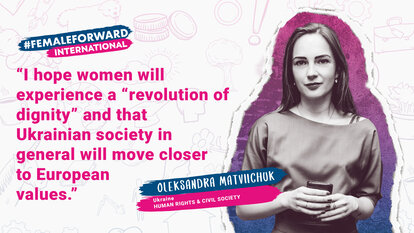#FEMALEFORWARDINTERNATIONAL
The uphill battle for a better Ukraine

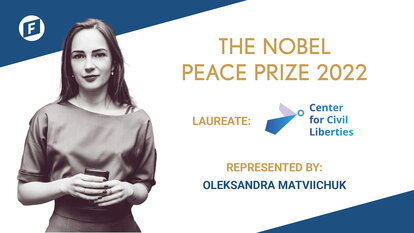
UPDATE
On the International Human Rights Day, the Nobel’s Peace Prize 2022 has been awarded to the Ukrainian human rights organisation Center for Civil Liberties; the human rights advocate Ales Bialiatski from Belarus; and the Russian human rights organisation Memorial. Heartfelt congratulations to the 3 laureates for their steadfast and courageous commitment to the fight for human rights and democracy. According to the Nobel Committee, ‘The Peace Prize laureates represent civil society in their home countries. They have for many years promoted the right to criticise power and protect the fundamental rights of citizens. They have made an outstanding effort to document war crimes, human right abuses and the abuse of power. Together they demonstrate the significance of civil society for peace and democracy.’
We are happy to have collaborated with the Ukrainian human rights organization and with Oleksandra, who was featured in the #FemaleForwardInternational campaign of FNF for female empowerment and leadership best practices.
Female Forward International Interview
Human rights activist and head of Centre for Civil Liberties Oleksandra Matviichuk on the need of major reforms in Ukraine and the often complex relationship between authorities and society. The interview is made before the war of February 2022.
“Unfortunately, our government and authorities are not in favour of human rights”, says Oleksandra Matviichuk, with a voice that has been trained in explaining complicated topics in a simple way. She is a human rights defender working on issues in Ukraine and the Eurasia region with a focus on creating horizontal structures that increase civic involvement in human rights activities to protect rights and freedoms. The importance of her work grows daily.
Matviichuk was born in 1983, when Ukraine was still part of the USSR. She has witnessed first-hand the struggles of her country, which gained independence at the end of 1991. At present, Ukraine still faces major challenges in establishing a healthy democracy, overcoming poverty, dealing with civil unrest, introducing much needed reforms, and navigating a particularly tense relationship with Russia, which annexed the Crimean Peninsula in 2014. That event was preceded by mass protests against Ukraine’s former President, Viktor Yanukovych, who, as an ally of Vladimir Putin, had rejected the European Union-Ukraine Association Agreement a year before and brought further tension to the Russia-Ukraine border.
Though this region has few obvious answers to how its many riddles can be solved, people like Oleksandra are part of the solution. How did it all begin for her?
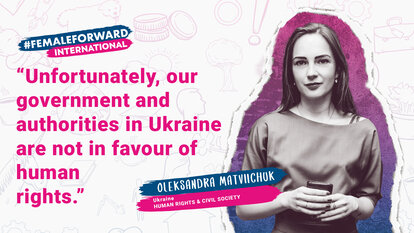
Before the Euromaidan
Matviichuk has a law degree from the Taras Shevchenko National University in Kyiv. “I didn’t have very specific plans when I was in school. I wanted to be a producer in theatre but instead decided to study law to protect human rights”, she says. Eventually, the activist in her took hold. “I was always very sensitive to injustice”, she says and explains this by citing her background, part of Ukraine’s often turbulent and traumatic history as part of the USSR.
At present, she heads the human rights organization Centre for Civil Liberties (CCL). She began working for CCL in 2007, when it was first established with the goal to promote the values of human rights, democracy, and solidarity.
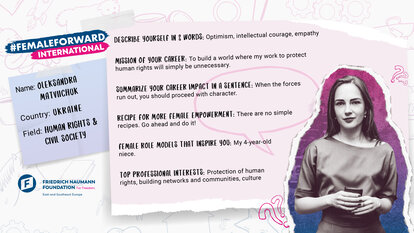
“Before I started at CCL, I had professional experience in youth organisations and commercial law. It was a way to combine and balance everything I’d learned up to that point.” Currently, CCL is engaged in introducing legislative amendments to assist the democratic transformation of the country and to help the public control law enforcement agencies and the judiciary. It also conducts training events for young people and implements programmes promoting international solidarity.
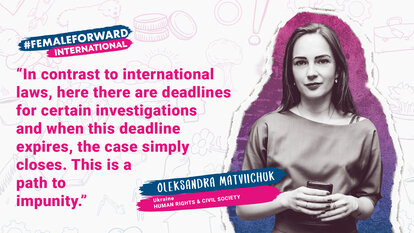
Standing up for the oppressed
Would she say her life today is split between before and after the events of 2013-2014, when the Euromaidan mass protests peaked?
“It was indeed one of the most crucial moments in our history since independence”, she says but notes at the same time that she had already been engaged with human rights and activism. What changed was how the Centre for Civil Liberties became even more active in providing aid. “For example, we never provided direct legal support to people in need before. We had to be quick and flexible to adapt to these new challenges, to offer an effective response to the events”, says Oleksandra, also the initiator of the #SaveOlegSentsov, the global initiative for the release of illegally imprisoned people in Russia and the occupied territories of Crimea and Donbas. She also coordinates ‘Euromaidan SOS’, an initiative started in 2013 during Euromaidan to help locate protestors gone missing.
In 2016, Oleksandra received the Democracy Defender Award for “Exclusive Contribution to Promoting Democracy and Human Rights” from the Organization for Security and Co-operation in Europe (OSCE). In 2017, she became the first woman to participate in the Ukrainian Emerging Leaders Program of Stanford University in the US. Through the years, she has been the author of a number of reports on violence against peaceful protesters, political prisoners, and various human rights violations in the region to several United Nation bodies, such as the Council of Europe, European Union, OSCE, and the International Criminal Court.
One focus of her work is the updating of Ukraine’s Criminal Code, a topic she has been particularly interested since the 2013-2014 events. During the Euromaidan and while Russia has been occupying the Crimea and the Donbas region, she has been documenting the different kinds of violations inflicted by the armed forces on hundreds of people. They often sound like medieval tortures: abduction, killings, beatings, rapes, and the mutilation of bodies. “It’s dramatic. People have suffered.”
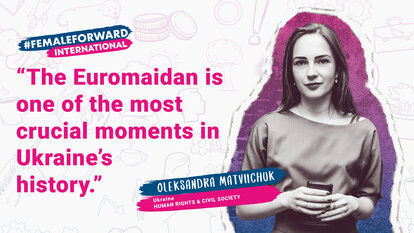
Ukraine’s national investigative body and its associated prosecutors don’t have access to the occupied territories and, at the same time, she finds that the way the relevant laws and regulations are drafted is insufficient to kick start any legal process on international crimes. “In contrast to international laws, here there are deadlines for certain investigations and when a deadline expires, the case simply closes. This means few results because it is hard to collect evidence. Criminals go unpunished, including war criminals.”
In 2021, Matviichuk was the Ukrainian nominee for a position on the United Nation’s Committee against Torture.
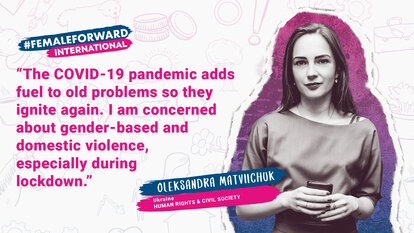
Progress (un)locked
Matviichuk and her team at the Centre for Civil Liberties have kept busy during the pandemic, to say the least. “When the pandemic started in early 2020, Ukraine also imposed a lockdown. We were worried that there would be human rights violations once the government began setting limitations.” There was no guarantee that restrictions would be carried out in the best way possible. “According to the constitution, the government can’t limit freedom of movement or other human rights, it doesn’t have the laws to do that. And laws must be created to secure the legitimacy of the process and the rights of people”, she adds.
This means that many restrictions are unconstitutional and gives room for the authorities to go unchecked. “We started an oversight of police activity, we feared that people would face problematic situations.” In many cases, their fears were confirmed. “In the summer of 2020, we offered the government our recommendations on how to handle the second lockdown that we sensed was coming. These ideas are still on the table.”
Gender-based and domestic violence are also topics she has been concerned about because during lockdown, those living in abusive conditions continue to live with their partners. “The COVID-19 pandemic adds fuel to old problems so they ignite again.”
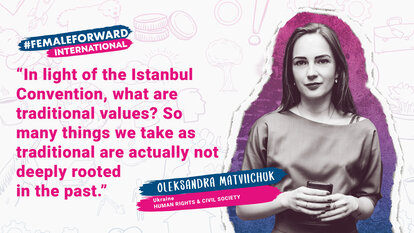
A further complication is that Ukraine has yet to ratify the Istanbul Convention on preventing and combating violence against women and domestic violence. In Ukraine, as in several other East and Middle European countries such as Poland, Hungary, and Bulgaria, this human rights treaty has attracted controversies and conspiracy theories. Some religious and conservative voices see the Convention as a threat to traditional values and national identity because they believe it imposed an “ideology” of LGBT rights. Apart from people falling for this fake news, Oleksandra sees a deeper nuance in the way societies in the region think. “But what are traditional values? So many things we take as traditional are actually not that deeply rooted in the past.”
For over half a year now, a draft law on international crimes has remained unsigned by the current President, Volodymyr Zelensky, a former TV host and producer who entered politics in 2018 and won the presidential elections in 2019, taking 73.2% of the popular vote in the second round and defeating Petro Poroshenko. For Oleksandra, his stance is puzzling. “There hasn’t been any explanation for his silence. Journalists have also inquired but received no answer. You see, the system in Ukraine requires total loyalty to the President – he is the one who chooses the General Prosecutor. If he stays silent on a subject, the whole system is silent.”
During the last year and a half, the events in Belarus, where protests against the government of long-ruling President Alexander Lukashenko resulted in riots and arrests, come as a strange déjà vu for the activists in Ukraine. “Of course, in Belarus’ case the events are much more encompassing and serious – it has lasted much longer than in Ukraine plus it is harder to leave the country. Many more people were arrested”, says Oleksandra, who along with her team has initiated peaceful demonstrations in support of the movement. “We also follow the development of a very cruel practice of Belarusian authorities: when family partners actively protest or are imprisoned, their kids can be taken away and sent to a boarding school.”
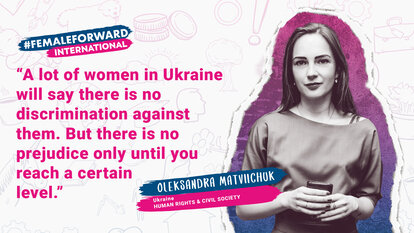
Pushing the invisible ceiling away
Oleksandra Matviichuk finds that discrimination against women is not that visible in Ukraine but still present if you know where to look. “A lot of women here will say there is no discrimination against them but that is because prejudice only starts when you reach a certain level. I started to feel it a bit later in life”, says Oleksandra who confides she has faced inappropriate situations. “There’s a glass ceiling which limits one’s development.”
Being a woman has also created situations where she hasn’t been taken seriously enough by people in power. A former Minister of Internal Affairs once commented on her beautiful dress. "Well, thanks for the compliment but it’s not like he would say to a man that he has a beautiful suit just to avoid answering a question”, she adds.
She hopes that women will experience a “revolution of dignity” and that society in general will move closer to European values. “Sooner or later, I hope that women in Ukraine will not see the glass ceiling to their professional development that I’m seeing right now.”
